Can Steam Set Off a Fire Alarm or Smoke Detector?
Author: Omar Alonso | Editor: Omar Alonso
Review & Research: Jen Worst & Chris Miller
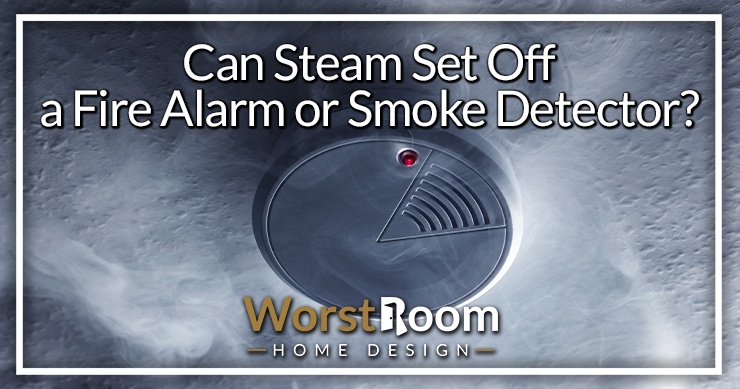
How many times has the smoke detector in your home sounded a false alarm over something? According to data, there’s a 98% chance of a false alarm rather than real alerts for these devices. While that's not a great accuracy rate, the two times of the 100 that produces a genuine warning makes it worth keeping them in your home. Then we start to ask questions like "can steam set off a fire alarm?"
With all the false alarms triggered by these devices, we must wonder what causes this phenomenon. Can high humidity conditions in the home trigger an alert on these devices? This post answers these questions, giving you more insight into what causes false alarms in smoke detectors.
Fire Alarm Models & How Steam Might Set Them Off
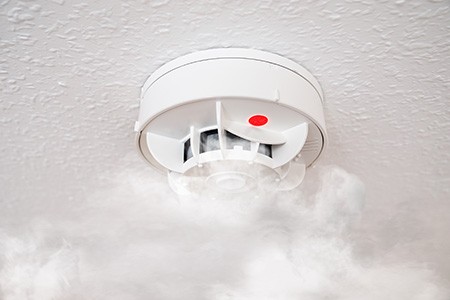
There are three types of fire alarms or smoke detectors. The most common device found in homes across America is the "ionization detector."
These devices are budget-friendly and easy to install. The ionization detector consists of dual electrically charged plates housing a tiny amount of radioactive material that is safe to be around (it's not going to cause your home to turn into the next Chernobyl, we promise).
This material ionizes the air around the device, creating a flow between the plates. When smoke enters the area between the plates, it disrupts the ionic flow, activating the fire alarm.
The second type of smoke detector/fire alarm is the "photoelectric detector." This device projects a light beam into the sensor chamber in the device. The light source angles away from the sensor, and when smoke enters the unit, it reflects the light off of the smoke onto the sensor, sounding the alarm.
Hybrid models are also available that implement both systems for enhanced accuracy in the fire alarm/smoke detector. The "dual-sensor" models have a higher success rate at detecting fires before they become life-threatening.
According to a National Fire Protection Association report, the ionization detector is better at sensing flaming fires, and photoelectric models are better at detecting smoldering fires. Since both types of fires can occur in any home, using a dual hybrid smoke detector/fire alarm is the best choice for safety. Keep your fire extinguisher charged up and ready to be used, too.
How Can Steam Set Off a Fire Alarm or Smoke Detector?
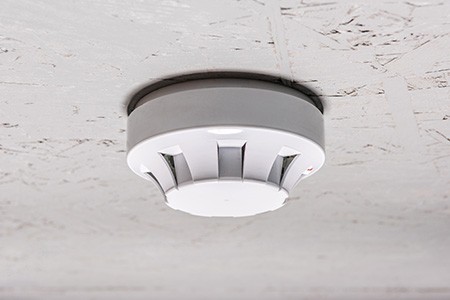
So, will steam set off a fire alarm or smoke detector? Yes, it can. As mentioned, these devices have a high false alarm rate. One of the reasons for the high number of false alarms comes from the fact that steam particles behave similarly to smoke.
The photoelectric smoke detector is more prone to creating false alarms from exposure to steam. The light beams inside these models bounce as readily off steam as they do smoke. However, ionization detectors are also prone to generating false positives from exposure to concentrated steam. The steam changes the way the ions flow between the plates inside the device, causing a false alarm.
Does Excessive Humidity Set Off a Fire Alarm or Smoke Detector?
It's also important to note that high humidity in a room can also cause a false alarm in a smoke detector/fire alarm.
We measure humidity in the home in "Relative Humidity" (RH). This measurement defines the comparison between water vapor in the air to water vapor content in the air at the saturation point. We express RH as a percentage.
According to manufacturers of these devices, relative humidity levels over 85% can cause a false alarm. The average home sits at an RH of 55% to 50%, depending on the environmental conditions. In warms regions around the coastlines of the Gulf, humid days can produce RH values up to 85% in the air inside homes, triggering false alarms with smoke detectors/fire alarms.
Humidity can elevate in the home due to external factors like hot showers in cold weather conditions or boiling water on the stove or in the kettle.
How to Stop Steam & Humidity From Setting Off Your Fire Alarm
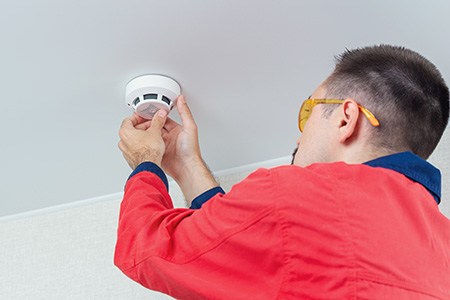
Homeowners that experience frequent false alarms from smoke detectors/fire alarms might find it tempting to disconnect the device to get some peace and quiet. However, this is a mistake; what happens in the one instance where there is a fire, and you've disconnected the device?
Instead of disconnecting the device, try these solutions to prevent false alarms. Let's look at how to stop steam from setting off a fire alarm.
Regularly Test the Fire Alarm/Smoke Detector
Regularly testing the fire alarm/ smoke detector is the best way to ensure its operating correctly. Grab a ladder, set it up under the smoke detector, and look at the external housing of the device. Most models have a test button on the casing; some might require opening the housing to find the test button.
Locate and press the button, holding it for a few seconds until the unit starts beeping. If the alarm sounds, it means the device is functioning as normal. If you don't hear any noise, the unit is dysfunctional. In this case, change the batteries and reset it, then try the test again.
If you replace the batteries and it still doesn't sound the alarm, or you hear a weak alarm, you'll need to replace the unit.
Change Locations
If you're frequently experiencing false alarms from the fire alarm/smoke detector, it might be due to the unit's location in your home. Can steam set off a fire alarm? Yes, and units near a kitchen are most susceptible.
Repositioning the device may reduce the number of false alarms. Position the device away from steam sources, such as the kettle or stove. People ask can boiling water set off a fire alarm, and yes, it can because it creates steam.
Improve Ventilation
Does steam set off a smoke detector? Yep, and steam can travel some distance in the home. Open the bathroom door after a hot shower, and you'll see the steam billowing into the bedroom. So, repositioning the fire alarm/smoke detector might not be enough to reduce the number of false positives produced by the unit.
If that's the case, consider ventilating the bathroom to exhaust the steam after taking a hot shower or bath. Ventilating the kitchen prevents steam produced by boiling water from setting off the smoke alarm. Ventilating these areas in the home has many benefits besides reducing false alarms in your smoke detector.
Removing the additional steam drops the RH level in the room, stopping it from ruining brickwork, wallpaper, and wood. Mold loves growing in humid conditions, and it's common for homes to experience outbreaks of dangerous black mold on ceiling boards in the bathroom.
Adding a vent fan to the bathroom or kitchen stops mold and false alarms.
What Usually Sets Off a Fire Alarm or Smoke Detector?
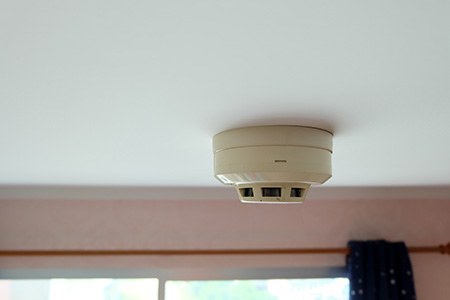
While steam is a common cause of false alarms with smoke detectors/fire alarms, it's not the only culprit responsible for this problem. Here are a few other causes of false alarms with these devices.
Dust
Dust in the room can enter the smoke detector and disrupt the sensors, causing a false alarm. If there's a dust storm outdoors and these particles enter the home, they travel in the air column and enter the fire alarm/smoke detector housing, causing a false alarm.
Low Battery
As mentioned, low battery levels cause issues with false positives. A lack of charge in the device makes it dysfunctional, creating a higher probability of the unit producing false alarms. If your fire alarm goes off randomly for a few seconds, it can be because of the battery, but it usually will just chirp every 5 minutes or so.
Insect Invasions
Some insects are small enough to crawl between the small vent slats on the fire alarm housing. They might fly around inside the unit, causing disruption in the sensors and leading to a false alarm.
They get attracted to the LED light on them, especially those in garages in the evening. This has happened to me and took me forever to figure it out as all the alarms throughout the whole house kept going off at 3 AM.
Burning Food
Sooner or later, even the best chefs burn something in the kitchen. Whether overdoing it with the toaster or burning something in the pan, these fumes can cause a false alarm in the smoke detector. The smoke produced by these accidental kitchen mishaps can spread through the house, causing false alarms.
The Fireplace
Many homes in colder climates have a wood-burning type of fireplace for heating the living room or bedroom during the winter. While the chimney does a good job directing the smoke out of the room, it doesn't always work efficiently. You might have the flue adjusted at the wrong angle or put too much wood in the fireplace, causing some smoke to escape and setting off the fire alarm.
FAQ’s Regarding What Can Set Off a Fire Alarm
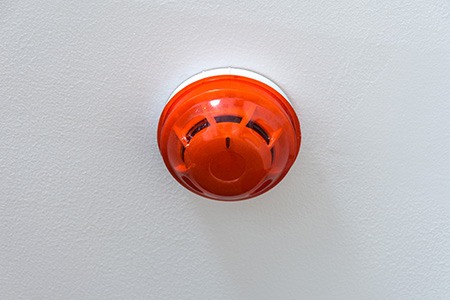
Here’s a few common questions we hear regarding this topic of does steam set off fire alarms and similar questions:
Can Aerosol Products Like Deodorant Cans or Room Fresheners Set Off the Fire Alarm?
Yes. These products can cause false alarms in smoke detectors. The particles can interrupt the ionized air or the photoelectric light beam.
Can a Vape Pen Create a False Alarm in a Smoke Detector?
Yes. Vaping can set off smoke detectors/fire alarms in the home. The vapor can interrupt the ionized air or the photoelectric light beam.
How Hot Does a Room Need to Get Before it Sets Off the Fire Alarm?
The room temperature must reach a factory set point of 136.4 °F (58 °C) before the device sounds an alarm.
Key Takeaways for Steam & Fire Alarm Interactions
Let’s do a quick summary of the main points we covered above:
- The approximate ratio of false alarms to genuine alarms in smoke detectors/fire alarms is 98%.
- Smoke detectors/fire alarms come in photoelectric, ionization, and hybrid models. All three are capable of causing false alarms.
- Steam is a common culprit of false alarms in smoke detectors/fire alarms. The device confuses the steam particles with smoke, causing it to sound.
- Typically, when RH levels around the smoke detector/fire alarm reach above 85%, it creates a false alarm in the device.
- Several other issues cause problems with false alarms in smoke detectors/fire alarms. Insects, dust, burning food, and fireplaces are common causes of false alarms.
With modern systems wired together throughout the entire house, the last thing you need is false alarms causing a panic to every family member or guest.
So, Can Steam Set Off a Fire Alarm?
People ask can steam set off a fire alarm and the answer is yes, which becomes obvious once you understand how fire alarms and smoke detectors are constructed and work, which we describe above. We provide solutions to stop this from happening, which are easy to implement so you can cook or iron clothes without concern.



